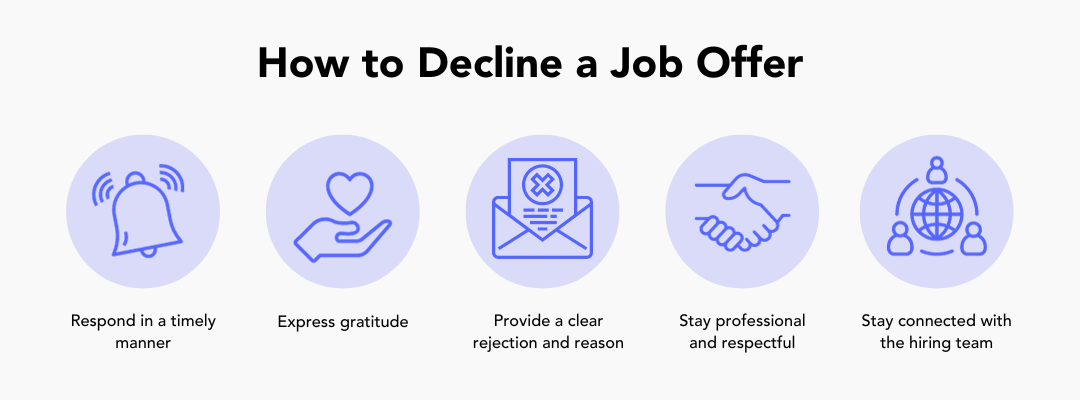Declining a job offer might not be on your list of favorite things to do, but it’s a skill worth mastering. After all, you want to keep those bridges intact, not set them ablaze!
Maybe you’ve received an offer for a position that just doesn’t feel like the right fit, the compensation just isn’t where you need it to be, or you’ve landed another job that you’re more excited about. Whatever the reason, turning down an employment opportunity gracefully is crucial for maintaining a good reputation.
How to decline a job offer respectfully
Even if you don’t see yourself working for the company you’re turning down, you never know when you’ll cross paths with members from your hiring team down the line.
Here are six tips for declining a job offer in a manner that will keep you in the good graces of hiring teams.

1. Respond in a timely manner.
One of the cardinal rules of responding to a job offer (regardless of whether you’re declining or accepting) is to do so promptly. The hiring process is often a time-sensitive affair, so leaving the hiring team hanging can cause frustration. Aim to send your response within a few days of receiving the offer, allowing the company to proceed with their search.
Above all, don’t ghost the employer!
RELATED: How to Cancel a Job Interview
2. Express gratitude for the opportunity.
Begin your response by expressing sincere gratitude for the opportunity. Thank the employer for considering you for the role and for taking the time to interview you. This simple act of appreciation sets a positive tone for the conversation.
3. Provide a polite— but clear— rejection.
It’s important to be direct and clear in your rejection while maintaining politeness. You don’t need to go into elaborate explanations; a straightforward statement that you’ve decided not to accept the offer suffices. Avoid ambiguous language that could lead to misunderstandings.
4. Offer a reason.
While it’s not always necessary, providing a brief and honest reason for your decision can be helpful. You’ve likely built a rapport with the hiring team at this point, and declining with no explanation can leave someone confused.
Reasons to decline a job offer include:
- You’ve decided to pursue another job offer that you received
- You don’t feel that the role is a good fit for your career trajectory
- The compensation or benefits are below your expectations
- Life situation has changed (e.g., you need to move closer to family)
While you want to be honest, avoid overly negative or critical comments about the company or role. Focus on your personal circumstances and preferences.
5. Stay professional.
Maintain professionalism throughout your communication. Even if you’re declining because of issues you had with the company during the interview process, it’s best to leave any negative feedback out of your initial response. Keep the conversation positive and respectful.
6. Keep the door open.
End your response on a positive note by expressing your interest in staying connected and hearing about future job opportunities down the line.
RELATED: What to Say in a Salary Negotiation Email
BONUS: Provide feedback or refer people who may be a good fit.
While this is certainly not a requirement and you don’t owe it to the employer, offering to provide feedback can be a great way to maintain a positive relationship with a hiring team.
Some companies send surveys to people to those who have gone through their hiring process in order to improve their candidate experience. Providing constructive feedback is a great way to stay engaged with the employer and help them make positive changes in their organization. Keep in mind that you should only give feedback like this if it is requested.
Similarly, offering to send referrals to the hiring team can earn you extra points. If you know someone in your network who would be a good fit for the role, don’t hesitate to let them know. This can save the team from starting back at square one if they don’t have any other candidates lined up.
Declining a job offer email example
Now wrap it all up into one succinct email. Here’s an example of what yours may look like— but remember, don’t copy and paste! Craft an email that is genuine and unique to your experiences with the company.
Subject: Re: Job Offer – [Position Name]
Dear [Hiring Manager’s Name],
I hope this email finds you well. I want to express my sincere gratitude for extending the offer for the [Position Name] role at [Company Name]. It has been a pleasure getting to know your team during the interview process, and I appreciate the time and effort you’ve invested in considering me for this opportunity.
After careful consideration, I have decided to decline the job offer. This decision wasn’t easy, as I have so much respect for [Company Name] and the work you do. However, I have accepted another position that aligns more closely with my long-term career goals, and I believe it’s the right path for me at this time.
I want to thank you once again for your offer and your understanding. I genuinely hope our paths cross in the future, and I would be open to exploring opportunities with [Company Name] down the line.
Additionally, I’d be happy to provide feedback on the candidate experience or refer connections that may be perfect for the role. Please feel free to reach out if you have any questions or need any other information.
Warm regards,
[Your Name]
Don’t burn your bridges
Declining a job offer respectfully is a skill that can serve you well throughout your career. By following these steps and maintaining a professional and courteous approach, you can ensure that you leave a positive impression even when saying no. Remember, the professional world is smaller than you might think, and you never know when you’ll encounter these individuals or organizations again in your journey.
